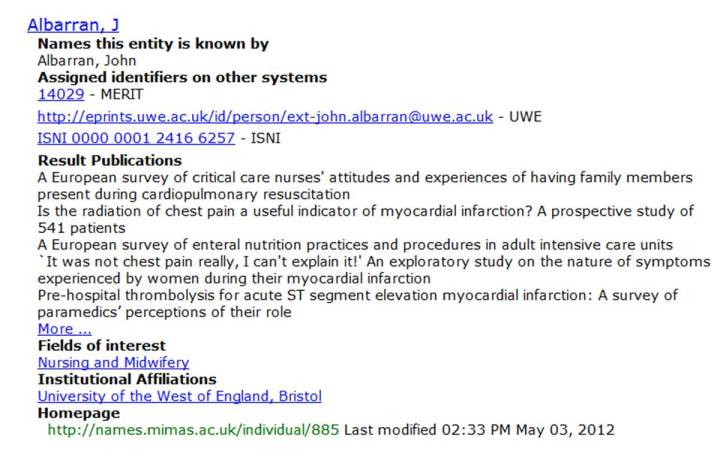ISNIs assigned to Names identities
The Names Project team have been collaborating with colleagues at OCLC and the British Library who are part of an international partnership developing the International Standard Name Identifier (ISNI) system. ISNI identifies a wide range of entities, including organisations and individuals. The identifier is based on an International Organization for Standardization (ISO) standard which was published in March of this year (press release).
ISNIs take the form of 16-digit numbers which are associated with a name and some basic identifying information such as (for an individual) the name of a publication. Over 40,000 individuals who have been uniquely identified in the Names system have now been assigned ISNIs and in the last week those identifiers were imported into the Names database and are now available.
The record below shows how Names records now bring together information on a variety of identifiers. This individual, John Albarran, has three external identifiers associated with him. The MERIT identifier is the one derived from the 2008 Research Assessment Exercise data processed by Names; an identifier within a national system. The UWE identifier is a local identifier from the University of the West of England’s Research Repository, while the ISNI is the first international identifier for this individual. These are all associated with John Albarran’s Names identifier (http://names.mimas.ac.uk/individual/885.html).
The ISNI database is designed to be relatively lightweight, so the information available there is less comprehensive than that in the Names system, as can be seen in the screenshot below:
As ISNI is interested in organisations as well as individuals, there is also an identifier for the University of the West of England in the ISNI database:
The ISNI database holds records derived from OCLC’s Virtual International Authority File, which brings together data on individuals identified in national library authority files. The Names records, and information from ProQuest’s Scholar Universe system, extend the ISNI data into the realm of identifying authors of articles as well as those individuals who have been involved in writing books.
We have to accept that there will be many identifiers associated with individuals during the course of their careers. For UK researchers, Names provides a place where institutional identifiers can be linked to a national one. On an international level, ISNI provides an equivalent service for linking together national identifiers.
GrandIR technical meeting on author identifiers and ORCID
The Names Project was represented at an event in Barcelona today which looked at the role of author identifiers and ways of integrating them into the procedures of institutions, and institutional repositories in particular. A number of different perspectives were presented at the event, including publishers, funders and identifier providers. There are videos of the talks available:
Martin Fenner on ORCID:
Me on the Names Project:
Gerry Lawson on the funder’s perspective:
Some interesting statistics emerged from Gerry Lawson’s talk concerning the number of researchers in Europe. All European governments have to report on the numbers of full-time-equivalent researchers in higher education, business, government and non-profit sectors. These figures are available from the Eurostat site and cover the years 1999 to 2010. The figures for the UK between 2005 and 2010 are fairly static, with a high of 254,009 in 2006 to a low of 235,373 in 2010. Germany has the highest number of researchers, at 327,500, with a noticeable increase in numbers each year. For the EU as a whole, the figure for 2010 is over 1.5 million researchers.
The number of individuals represented by these figures will be higher than the total of FTEs, of course, but at least this gives us an idea of the number of people who may ultimately need to be covered by services like Names (and some confidence in the figure of 20% of UK researchers that we’ve been estimating that Names currently holds). Philip Purnell’s presentation also gave us some figures for the number of researcher who have registered with the ResearcherID service from Thomson Reuters. For the UK, this is currently 14,033.
It will be interesting to see how many researchers sign up for an ORCID identifier when the service launches on 15th October. One of the options that will be offered is the ability to transfer information from an existing ResearcherID into an ORCID, which will be useful those researchers who are already registered in that service. ResearcherID also offers institutions the option of assigning IDs in batches, free of charge, to their researchers. This differs from the ORCID model, which will allow institutions to submit ORCIDs in bulk only if they are ORCID members (at an annual cost of $5,000 for small institutions). Martin Fenner suggested that small institutions might want to encourage their researchers to register themselves, as this process is free of charge.




leave a comment